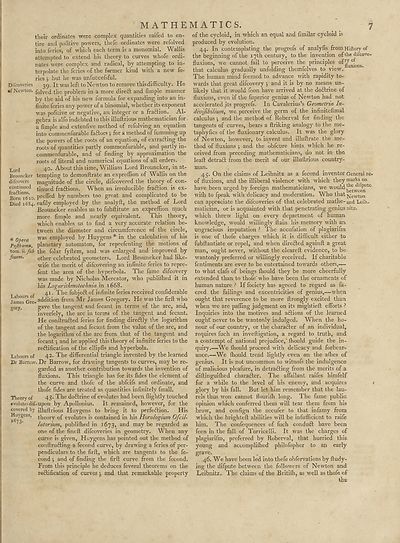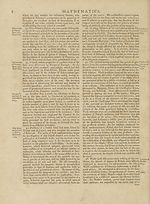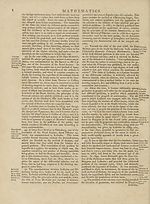Encyclopaedia Britannica, or, a Dictionary of arts, sciences, and miscellaneous literature : enlarged and improved. Illustrated with nearly six hundred engravings > Volume 13, MAT-MIC
(15) Page 7
Download files
Complete book:
Individual page:
Thumbnail gallery: Grid view | List view

7
MATHEMATICS.
their ordinates were complex quantities raifed to en¬
tire and po-fitive powers, thefe ordinates were refolved
into feries, of which each term is a monomial. Wallis
attempted to extend his theory to curves whofe ordi¬
nates were complex and radical, by attempting to in¬
terpolate the feries of the farmer kind with a new fe¬
ries •, but he was unfuccefsful.
Difcoveries It was left to Newton to remove thisdifficulty. He
•f Newton. f()jvcc[ the problem in a more dire£l and fitriple manner
by the aid of his new formula for expanding into an in¬
finite feries any power of a binomial, whether its exponent
wus pofitive or negative, an integer or a fraftion. Al¬
gebra is alfo indebted to this illuftrious mathematician for
a fimple and extenfive method of refolving an equation
into com men fur able faftors 5 for a method of fumming up
the powers of the roots of an equation, of extra£ting the
roots of quantities partly commenfurable, and partly in-
commenfurable, and of finding by approximation the
roots of literal and numerical equations of all orders.
Lord 4°- About this time, William Lord Brouncker, in at-
Brouncker tempting to demonftrate an expreflion of Wallis on the
difeovers magnitude of the circle, difeovered the theory of con-
continued (_jnUCd fractions. When an irreducible fraction is ex-
BornTfoo. Puffed by numbers too great and complicated to be
Died 16S4. eafily employed by the analyft, the method of Lord
Brouncker enables us to fubftitute an exprefiion much
more fimple and nearly equivalent. This theory,
which enables us to find a very accurate relation be¬
tween the diameter and circumference of the circle,
* Opera was empl°ye(i by Huygens * in the calculation of his
Pojhuma, planetary automaton, for reprefenting the motions of
tom. ii./ub the folar fyftem, and was enlarged and improved by
finem. other celebrated geometers. Lord Brouncker had like-
wife the merit of difeovering an infinite feries to repre-
fent the area of the hyperbola. The fame difeovery
was made by Nicholas Mercator, who publithed it in
his Logarithmotechma in 1668.
41. The fubjeft of infinite feries received confiderable
JamesGre- addition from Mr James Gregory. He was the firft who
g0ry> gave the tangent and fecant in terms of the arc, and,
inverfely, the arc in terms of the tangent and fecant.
He conftru&ed feries for finding direftly the logarithm
of the tangent and fecant from the value of the arc, and
the logarithm of the arc from that of the tangent and
fecant; and he applied this theory of infinite feries to the
reftification of the ellipfis and hyperbola.
Labours of 42. The differential triangle invented by the learned
Dr Barrow. Dr Barrow, for drawing tangents to curves, may be re¬
garded as another contribution towards the invention of
fluxions. This triangle has for its fides the element of
the curve and thofe of the abfeifs and ordinate, and
thofe fides are treated as quantities infinitely fmall.
Theory of 43* The do&rine of evolutes had been (lightly touched
evolutesdif-upon by Apollonius. It remained, however, for the
covered by illuftrious Huygens to bring it to perfection. His
Huygens, theory of evolutes is contained in his Horologium Ofcil-
latorium, publifhed in 1673, and may be regarded as
one of the fineft difeoveries in geometry. When any
curve is given, Huygens has pointed out the method of
conftructing a fecond curve, by drawing a feries of per¬
pendiculars to the firft, which are tangents to the fe¬
cond •, and of finding the firft curve from the fecond.
From this principle he deduces feveral theorems on the
rectification of curves $ and that remarkable property
of the cycloid, in which an equal and fimilar cycloid is
produced by evolution.
44. In contemplating the progrefs of analyfis from Hiftory of
the beginning of the 17th century, to the invention of the difcove-
fluxions, we cannot fail to perceive the principles of
that calculus gradually unfolding themfelves to view.
The human mind feemed to advance with rapidity to¬
wards that great difeovery 5 and it is by no means un¬
likely that it would foon have arrived at the do&rine of
fluxions, even if the fuperior genius of Newton had not
accelerated its progrefs. In Cavalerius’s Geometna In~
divijibilium, we perceive the germ of the infinitefimal
calculus j and the method of Roberval for finding the
tangents of curves, bears a ftriking analogy to the me-
taphyfics of the fluxionary calculus. It wras the glory
of Newton, however, to invent and illuftrate the me¬
thod of fluxions •, and the obfeure hints which he re¬
ceived from preceding mathematicians, do not in the
leaft detrail from the merit of our illuftrious country¬
man.
45. On the claims of Leibnitz as a fecond inventor General re¬
ef fluxions, and the illiberal violence with which they marks on
have been urged by foreign mathematicians, we would
wilh to fpeak with delicacy and moderation. Who that 24ewton
can appreciate the difeoveries of that celebrated mathe- arid Leib-
matician, or is acquainted with that penetrating genius nitz.
which threw light on every department of human
knowledge, would willingly ftain his memory with an
ungracious imputation ? The accufation of plagiarifm
is one of thofe charges which it is difficult either to
fubftantiate or repel, and when direfted againft a great
man, ought never, without the cleareft evidence, to be
wantonly preferred or willingly received. If charitable
fentiments are ever to be entertained towards others,—
to what clafs of beings ffiould they be more cheerfully
extended than to thofe' who have been the ornaments of
human nature ? If fociety has agreed to regard as fa-
cred the failings and excentricities of genius,—w'hen.
ought that reverence to be more ftrongly excited than
when we are paffing judgment on its mightieft efforts ?
Inquiries into the motives and aftions of the learned
ought never to be wantonly indulged. When the ho¬
nour of our country, or the charadler of an individual,
requires fuch an inveftigation, a regard to truth, and
a contempt of national prejudice,' ftiould guide the in¬
quiry.—We ftiould proceed with delicacy and forbear¬
ance.—We ftiould tread lightly even on the affies of
genius. It is not uncommon to witnefs the indulgence
of malicious pleafure, in detradling from the merits of a
diftinguiffied charadler. The affailant raifes himfelf
for a while to the level of his enemy, and acquires 1
glory by his fall. But let him remember that the lau¬
rels thus won cannot flourifti long. The fame public
opinion which conferred them will tear them from his
brow, and confign the accufer to that infamy from
which, the brighteft abilities rvill be infuffieient to raife
him. The confequences of fuch conduct have been
feen in the fall of Torricelli. It was the charges of
plagiarifm, preferred by Roberval, that hurried this,
young and aceompliffied philbfopher to an early
grave.
46. We have been led into thefe obfervations by ftudy-
ing the difpute between the followers of Newton and
Leibnitz. The claims of the Britifh, as well as thofe of
the
MATHEMATICS.
their ordinates were complex quantities raifed to en¬
tire and po-fitive powers, thefe ordinates were refolved
into feries, of which each term is a monomial. Wallis
attempted to extend his theory to curves whofe ordi¬
nates were complex and radical, by attempting to in¬
terpolate the feries of the farmer kind with a new fe¬
ries •, but he was unfuccefsful.
Difcoveries It was left to Newton to remove thisdifficulty. He
•f Newton. f()jvcc[ the problem in a more dire£l and fitriple manner
by the aid of his new formula for expanding into an in¬
finite feries any power of a binomial, whether its exponent
wus pofitive or negative, an integer or a fraftion. Al¬
gebra is alfo indebted to this illuftrious mathematician for
a fimple and extenfive method of refolving an equation
into com men fur able faftors 5 for a method of fumming up
the powers of the roots of an equation, of extra£ting the
roots of quantities partly commenfurable, and partly in-
commenfurable, and of finding by approximation the
roots of literal and numerical equations of all orders.
Lord 4°- About this time, William Lord Brouncker, in at-
Brouncker tempting to demonftrate an expreflion of Wallis on the
difeovers magnitude of the circle, difeovered the theory of con-
continued (_jnUCd fractions. When an irreducible fraction is ex-
BornTfoo. Puffed by numbers too great and complicated to be
Died 16S4. eafily employed by the analyft, the method of Lord
Brouncker enables us to fubftitute an exprefiion much
more fimple and nearly equivalent. This theory,
which enables us to find a very accurate relation be¬
tween the diameter and circumference of the circle,
* Opera was empl°ye(i by Huygens * in the calculation of his
Pojhuma, planetary automaton, for reprefenting the motions of
tom. ii./ub the folar fyftem, and was enlarged and improved by
finem. other celebrated geometers. Lord Brouncker had like-
wife the merit of difeovering an infinite feries to repre-
fent the area of the hyperbola. The fame difeovery
was made by Nicholas Mercator, who publithed it in
his Logarithmotechma in 1668.
41. The fubjeft of infinite feries received confiderable
JamesGre- addition from Mr James Gregory. He was the firft who
g0ry> gave the tangent and fecant in terms of the arc, and,
inverfely, the arc in terms of the tangent and fecant.
He conftru&ed feries for finding direftly the logarithm
of the tangent and fecant from the value of the arc, and
the logarithm of the arc from that of the tangent and
fecant; and he applied this theory of infinite feries to the
reftification of the ellipfis and hyperbola.
Labours of 42. The differential triangle invented by the learned
Dr Barrow. Dr Barrow, for drawing tangents to curves, may be re¬
garded as another contribution towards the invention of
fluxions. This triangle has for its fides the element of
the curve and thofe of the abfeifs and ordinate, and
thofe fides are treated as quantities infinitely fmall.
Theory of 43* The do&rine of evolutes had been (lightly touched
evolutesdif-upon by Apollonius. It remained, however, for the
covered by illuftrious Huygens to bring it to perfection. His
Huygens, theory of evolutes is contained in his Horologium Ofcil-
latorium, publifhed in 1673, and may be regarded as
one of the fineft difeoveries in geometry. When any
curve is given, Huygens has pointed out the method of
conftructing a fecond curve, by drawing a feries of per¬
pendiculars to the firft, which are tangents to the fe¬
cond •, and of finding the firft curve from the fecond.
From this principle he deduces feveral theorems on the
rectification of curves $ and that remarkable property
of the cycloid, in which an equal and fimilar cycloid is
produced by evolution.
44. In contemplating the progrefs of analyfis from Hiftory of
the beginning of the 17th century, to the invention of the difcove-
fluxions, we cannot fail to perceive the principles of
that calculus gradually unfolding themfelves to view.
The human mind feemed to advance with rapidity to¬
wards that great difeovery 5 and it is by no means un¬
likely that it would foon have arrived at the do&rine of
fluxions, even if the fuperior genius of Newton had not
accelerated its progrefs. In Cavalerius’s Geometna In~
divijibilium, we perceive the germ of the infinitefimal
calculus j and the method of Roberval for finding the
tangents of curves, bears a ftriking analogy to the me-
taphyfics of the fluxionary calculus. It wras the glory
of Newton, however, to invent and illuftrate the me¬
thod of fluxions •, and the obfeure hints which he re¬
ceived from preceding mathematicians, do not in the
leaft detrail from the merit of our illuftrious country¬
man.
45. On the claims of Leibnitz as a fecond inventor General re¬
ef fluxions, and the illiberal violence with which they marks on
have been urged by foreign mathematicians, we would
wilh to fpeak with delicacy and moderation. Who that 24ewton
can appreciate the difeoveries of that celebrated mathe- arid Leib-
matician, or is acquainted with that penetrating genius nitz.
which threw light on every department of human
knowledge, would willingly ftain his memory with an
ungracious imputation ? The accufation of plagiarifm
is one of thofe charges which it is difficult either to
fubftantiate or repel, and when direfted againft a great
man, ought never, without the cleareft evidence, to be
wantonly preferred or willingly received. If charitable
fentiments are ever to be entertained towards others,—
to what clafs of beings ffiould they be more cheerfully
extended than to thofe' who have been the ornaments of
human nature ? If fociety has agreed to regard as fa-
cred the failings and excentricities of genius,—w'hen.
ought that reverence to be more ftrongly excited than
when we are paffing judgment on its mightieft efforts ?
Inquiries into the motives and aftions of the learned
ought never to be wantonly indulged. When the ho¬
nour of our country, or the charadler of an individual,
requires fuch an inveftigation, a regard to truth, and
a contempt of national prejudice,' ftiould guide the in¬
quiry.—We ftiould proceed with delicacy and forbear¬
ance.—We ftiould tread lightly even on the affies of
genius. It is not uncommon to witnefs the indulgence
of malicious pleafure, in detradling from the merits of a
diftinguiffied charadler. The affailant raifes himfelf
for a while to the level of his enemy, and acquires 1
glory by his fall. But let him remember that the lau¬
rels thus won cannot flourifti long. The fame public
opinion which conferred them will tear them from his
brow, and confign the accufer to that infamy from
which, the brighteft abilities rvill be infuffieient to raife
him. The confequences of fuch conduct have been
feen in the fall of Torricelli. It was the charges of
plagiarifm, preferred by Roberval, that hurried this,
young and aceompliffied philbfopher to an early
grave.
46. We have been led into thefe obfervations by ftudy-
ing the difpute between the followers of Newton and
Leibnitz. The claims of the Britifh, as well as thofe of
the
Set display mode to:
![]() Universal Viewer |
Universal Viewer | ![]() Mirador |
Large image | Transcription
Mirador |
Large image | Transcription
Images and transcriptions on this page, including medium image downloads, may be used under the Creative Commons Attribution 4.0 International Licence unless otherwise stated. ![]()
| Permanent URL | https://digital.nls.uk/192661357 |
|---|
| Attribution and copyright: |
|
|---|
| Description | Ten editions of 'Encyclopaedia Britannica', issued from 1768-1903, in 231 volumes. Originally issued in 100 weekly parts (3 volumes) between 1768 and 1771 by publishers: Colin Macfarquhar and Andrew Bell (Edinburgh); editor: William Smellie: engraver: Andrew Bell. Expanded editions in the 19th century featured more volumes and contributions from leading experts in their fields. Managed and published in Edinburgh up to the 9th edition (25 volumes, from 1875-1889); the 10th edition (1902-1903) re-issued the 9th edition, with 11 supplementary volumes. |
|---|---|
| Additional NLS resources: |
|

